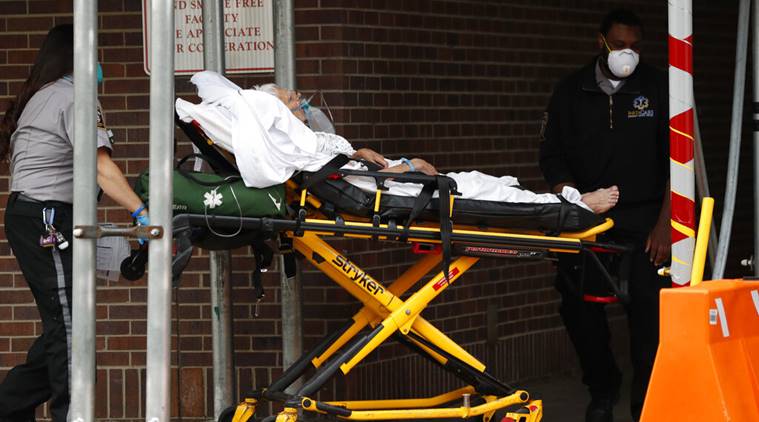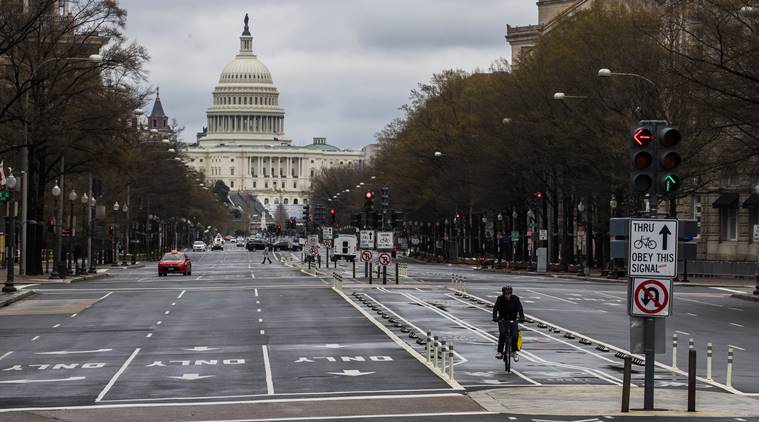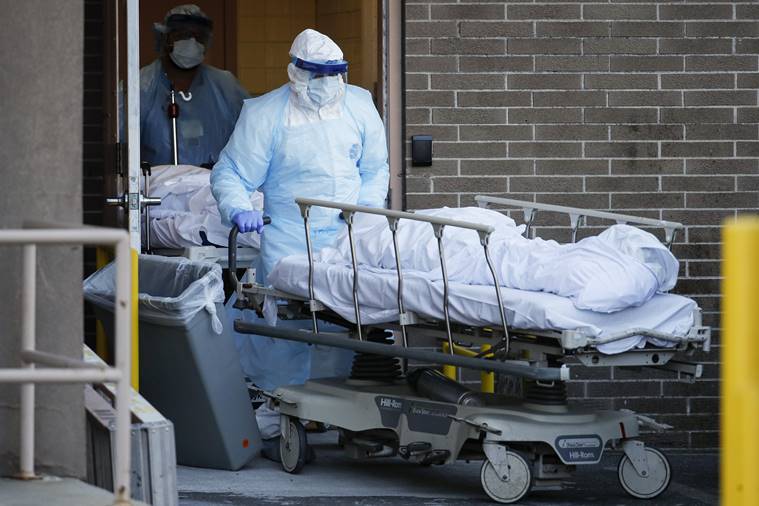- India
- International
Coronavirus: Trump’s aggressive advocacy of malaria drug divides medical community
If hydroxychloroquine becomes an accepted treatment, several pharmaceutical companies stand to profit, including shareholders and senior executives with connections to the president.
 President Donald Trump listens during a briefing about the coronavirus in the James Brady Press Briefing Room of the White House, Monday, April 6, 2020, in Washington. (AP Photo: Alex Brandon)
President Donald Trump listens during a briefing about the coronavirus in the James Brady Press Briefing Room of the White House, Monday, April 6, 2020, in Washington. (AP Photo: Alex Brandon)
Written by Peter Baker, Katie Rogers, David Enrich and Maggie Haberman
President Donald Trump made a rare appearance in the Situation Room on Sunday as his pandemic task force was meeting, determined to talk about the anti-malaria medicine that he has aggressively promoted lately as a treatment for the coronavirus.
Once again, according to a person briefed on the session, the experts warned against overselling a drug yet to be proved a safe remedy, particularly for heart patients. “Yes, the heart stuff,” Trump acknowledged. Then he headed out to the cameras to promote it anyway. “So what do I know?” he conceded to reporters at his daily briefing. “I’m not a doctor. But I have common sense.”
Day after day, the salesman turned president has encouraged coronavirus patients to try hydroxychloroquine with all of the enthusiasm of a real estate developer. The passing reference he makes to the possible dangers is usually overwhelmed by the full-throated endorsement. “What do you have to lose?” he asked five times Sunday.
Bolstered by his trade adviser, a television doctor, Larry Ellison of Oracle and Rudy Giuliani, a former New York mayor, Trump has seized on the drug as a miracle cure for the virus that has killed thousands and paralyzed American life. Along the way, he has prompted an international debate about a drug that many doctors in New York and elsewhere have been trying in desperation even without conclusive scientific studies.

Trump may ultimately be right, and physicians report anecdotal evidence that has provided hope. But it remains far from certain, and the president’s assertiveness in pressing the case over the advice of advisers like Dr. Anthony S. Fauci, the government’s top infectious disease specialist, has driven a wedge inside his coronavirus task force and has raised questions about his motives.
Also read | Donald Trump warns of retaliation if India doesn’t export Hydroxychloroquine to US
If hydroxychloroquine becomes an accepted treatment, several pharmaceutical companies stand to profit, including shareholders and senior executives with connections to the president. Trump himself has a small personal financial interest in Sanofi, the French drugmaker that makes Plaquenil, the brand-name version of hydroxychloroquine.
“I certainly understand why the president is pushing it,” said Dr. Joshua Rosenberg, the medical director at Brooklyn Hospital Center. “He’s the president of the United States. He has to project hope. And when you are in a situation without hope, things go very badly. So I’m not faulting him for pushing it even if there isn’t a lot of science behind it, because it is, at this point, the best, most available option for use.”
A senior physician at Wyckoff Heights Medical Center in Brooklyn, New York, where doctors are not providing the drug, however, said the current demand was worrisome for patients on it chronically for rheumatic diseases. At St. Barnabas Hospital in the Bronx, another doctor said his staff was giving it to coronavirus patients but criticized the president and Gov. Andrew M. Cuomo for “cheerleading” the drug without proof. “False hope can be bad, too,” he said.
 Emergency medical responders wheel an elderly patient into the emergency room at Brooklyn Hospital Center on Sunday. (AP Photo)
Emergency medical responders wheel an elderly patient into the emergency room at Brooklyn Hospital Center on Sunday. (AP Photo)
The professional organization that published a positive French study cited by Trump’s allies changed its mind in recent days. The International Society of Antimicrobial Chemotherapy said, “The article does not meet the society’s expected standard.” Some hospitals in Sweden stopped providing hydroxychloroquine to treat the coronavirus after reports of adverse side effects, according to Swedish news media.
But Cuomo told reporters Monday that he would ask Trump to increase the federal supply of hydroxychloroquine to New York pharmacies, allowing the state to lift a limit on purchases. “There has been anecdotal evidence that it is promising,” Cuomo said, while noting the lack of a formal study.
Trump first expressed interest in hydroxychloroquine a few weeks ago, telling associates that Ellison, a billionaire and a founder of Oracle, had discussed it with him. At the time, Dr. Mehmet Oz, the host of television’s “The Doctor Oz Show,” was in touch with Trump’s advisers about expediting approval to use the drug for the coronavirus.
Explained | Hydroxychloroquine is recommended for very specific cases — here’s why it’s no silver bullet
Giuliani has urged Trump to embrace the drug, based in part on the advice of Dr. Vladimir Zelenko, a self-described simple country doctor who has become a hit on conservative media after administering a cocktail of hydroxychloroquine, the antibiotic azithromycin and zinc sulfate.
In an interview Monday, Giuliani denied any financial stake and said he spoke with Trump only after the president had already promoted the drug publicly. Giuliani said he turned to the issue after researching former Vice President Joe Biden in Ukraine, a project that led to the president’s impeachment.
The Food and Drug Administration, which has approved hydroxychloroquine as a treatment for malaria and lupus, issued an emergency order late last month allowing doctors to administer it to coronavirus patients if they saw fit. Trump said the federal government would distribute 29 million doses and that he had called Prime Minister Narendra Modi of India requesting more.
Fauci made his concern clear last week. “I think we’ve got to be careful that we don’t make that majestic leap to assume that this is a knockout drug,” he said Friday on Fox News. “We still need to do the kinds of studies that definitively prove whether any intervention, not just this one, any intervention is truly safe and effective.”
The same day, Laura Ingraham, a Fox host, visited Trump at the White House with two doctors who had been on her program promoting hydroxychloroquine, one of whom made a presentation on its virtues, according to an official, confirming a Washington Post report.
 With the US Capitol building in the background, a cyclist rides his bike on Pennsylvania Avenue NW, Wednesday, March 25, 2020, in Washington. Officials have urged Washington residents to stay home to contain the spread of the coronavirus. (AP Photo: Manuel Balce Ceneta)
With the US Capitol building in the background, a cyclist rides his bike on Pennsylvania Avenue NW, Wednesday, March 25, 2020, in Washington. Officials have urged Washington residents to stay home to contain the spread of the coronavirus. (AP Photo: Manuel Balce Ceneta)
The next day, Peter Navarro, the president’s trade adviser, who has been assigned to expedite production of medical equipment and become an advocate of the drug, upbraided Fauci at a White House task force meeting, according to people informed about the discussion.
Trump made clear Sunday whose side he took in Navarro’s confrontation with Fauci. At his briefing after the meeting, he said it was wrong to wait for the kind of study Fauci wanted. “We don’t have time,” the president said. “We don’t have two hours because there are people dying right now.”
HYDROXYCHLOROQUINE & AZITHROMYCIN, taken together, have a real chance to be one of the biggest game changers in the history of medicine. The FDA has moved mountains – Thank You! Hopefully they will BOTH (H works better with A, International Journal of Antimicrobial Agents)…..
— Donald J. Trump (@realDonaldTrump) March 21, 2020
Some associates of Trump’s have financial interests in the issue. Sanofi’s largest shareholders include Fisher Asset Management, the mutual fund company run by Ken Fisher, a major donor to Republicans, including Trump. A spokesman for Fisher declined to comment.
Another investor in both Sanofi and Mylan, another pharmaceutical firm, is Invesco, the fund previously run by Wilbur Ross, the commerce secretary. Ross said in a statement Monday that he “was not aware that Invesco has any investments in companies producing” the drug, “nor do I have any involvement in the decision to explore this as a treatment.”
As of last year, Trump reported that his three family trusts each had investments in a Dodge & Cox mutual fund, whose largest holding was in Sanofi.
Several generic drugmakers are gearing up to produce hydroxychloroquine pills, including Amneal Pharmaceuticals, whose co-founder Chirag Patel, is a member of Trump National Golf Course Bedminster in New Jersey and has golfed with Trump at least twice since he became president, according to a person who saw them.
Patel, whose company is based in Bridgewater, New Jersey, did not respond to a request for comment. Amneal announced last month that it would increase production of the drug and donate millions of pills to New York and other states. Other generic drugmakers are ramping up production, including Mylan and Teva Pharmaceutical Industries.
Roberto Mignone, a Teva board member, reached out to the team of Jared Kushner, the president’s son-in-law and senior adviser, through Nitin Saigal, who used to work for Mignone and is a friend of Kushner’s, according to people informed about the discussions.
 Medical workers wearing personal protective equipment wheel bodies to a refrigerated trailer serving as a makeshift morgue at Wyckoff Heights Medical Center, Monday, April 6, 2020, in New York. (AP Photo: John Minchillo)
Medical workers wearing personal protective equipment wheel bodies to a refrigerated trailer serving as a makeshift morgue at Wyckoff Heights Medical Center, Monday, April 6, 2020, in New York. (AP Photo: John Minchillo)
Kushner’s team referred him to the White House task force and Mignone asked for help getting India to ease export restrictions, which have since been relaxed, allowing Teva to bring more pills into the United States. Mignone, who is also a vice chairman of NYU Langone Health, which is running a clinical study of hydroxychloroquine, confirmed Monday that he has spoken with the administration about getting more medicine into the country.
Dr. Daniel H. Sterman, the critical care director at NYU Langone Health, said doctors there are using hydroxychloroquine, but data about its effectiveness remained “weak and unsubstantiated” pending the study. “We do not know whether our patients are benefiting from hydroxychloroquine treatment at the present time,” he said.
New York City’s Health and Hospitals Corp., which runs its public hospitals, is advising but not requiring doctors to use hydroxychloroquine based on a trial showing a decreased cough and fever with mild side effects in two patients, Dr. Mitchell Katz, who oversees the hospital system, said by email Monday.
Dr. Roy M. Gulick, the chief of infectious diseases at Weill Cornell Medicine, said hydroxychloroquine was given on a case-by-case basis. “We explain the pros and cons and explain that we don’t know if it works or not,” he said.
&Here’s a quick Coronavirus guide from Express Explained to keep you updated: What can cause a COVID-19 patient to relapse after recovery? | COVID-19 lockdown has cleaned up the air, but this may not be good news. Here’s why | Can alternative medicine work against the coronavirus? | A five-minute test for COVID-19 has been readied, India may get it too | How India is building up defence during lockdown | Why only a fraction of those with coronavirus suffer acutely | How do healthcare workers protect themselves from getting infected? | What does it take to set up isolation wards?
Apr 24: Latest News
- 01
- 02
- 03
- 04
- 05







































